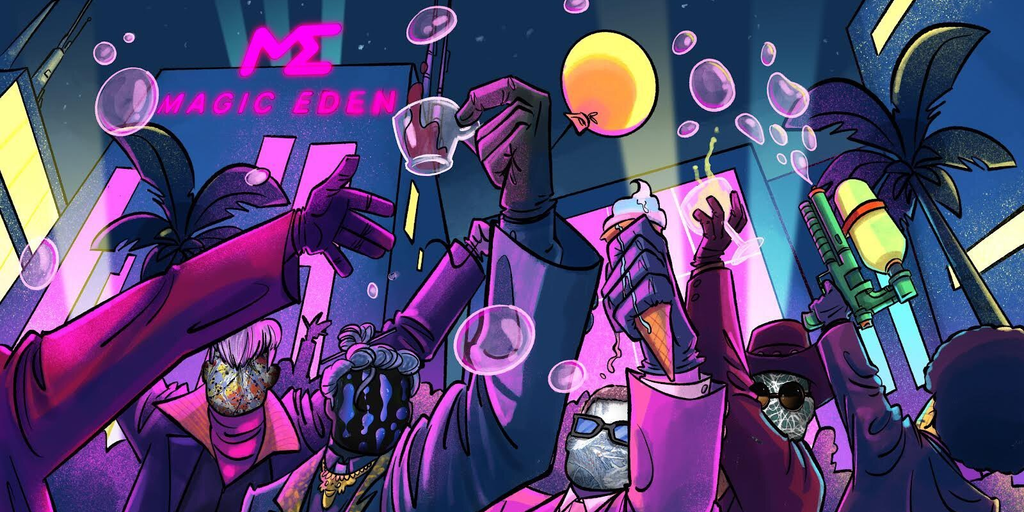
The growing hype surrounding Ordinals has established Bitcoin as an emerging frontier for trading digital collectibles. And as the landscape develops, the Solana-based NFT marketplace Magic Eden has quickly emerged as a new leader.
Ordinals—a protocol that enables content like art and text to be inscribed on individual satoshis, the smallest unit of measure that Bitcoin can be divided into—has exploded in popularity since it was introduced in January as traders and developers grow more familiar with NFT-like assets called inscriptions.
Magic Eden opened the door to trading inscriptions just over a week ago, on March 21, and has grown to represent a majority of Ordinals trading volume across various marketplaces that support them as of yesterday, according to a Dune dashboard created by a pseudonymous on-chain data enthusiast named Domo.
On Tuesday, Magic Eden racked up roughly $170,000 worth of inscription sales compared to around $72,000 on the second most popular marketplace, Ordinals Wallet.
BTC DeGods, a collection of inscriptions released by the creators of the most valuable Solana NFT profile picture (PFP) project, has played an influential role in Magic Eden’s ascension to the top, Domo told Decrypt via Twitter message.
The Bitcoin-based collection of profile pictures has notched nearly 35 BTC, or almost $1 million worth of total trading volume since it was released, with the cheapest inscription hovering around $23,000 worth of BTC as of this writing, according to Magic Eden.
Magic Eden still lags behind Ordinals Wallet in terms of total daily transactions, although the trend over the past week suggests that Magic Eden is chipping away at that lead. Yesterday, 404 inscriptions were traded on Magic Eden while Ordinals Wallet facilitated 543 sales, according to Domo’s dashboard.
In other words, Magic Eden is handling higher-value Ordinals sales. And the long-standing link between DeGods and Magic Eden on Solana—even though DeGods is about to migrate from Solana to Ethereum—may be translating over to Bitcoin as traders flock to the well-known marketplace’s latest incarnation.
When Magic Eden launched in 2021, it started out as a marketplace that solely supported NFTs created on Solana. But over time, the marketplace has added support for NFTs on other blockchains such as Ethereum and Polygon, the latter an Ethereum scaling network.
We built our Bitcoin marketplace in a month. To take it across the finish line, we rented a giant Airbnb in California and brought over a dozen devs together. As a mostly remote company, we’re proud to share some of our faces and tell our story.
BIG thank you to @bhammers for… pic.twitter.com/3Pu5zzXZ1u— Magic Eden
(@MagicEden) March 22, 2023
“We hope to continue to see both creator and user growth on Ordinals,” Magic Eden Head of Marketing Tiffany Huang told Decrypt. “A lot of creators I talk to are definitely interested and exploring it, especially after knowing high-value names like Yuga and DeGods are involved.”
For a user base that’s already familiar with trading collectibles across multiple networks, Magic Eden traders’ swift embrace of inscriptions on Bitcoin makes sense, according to Domo.
“Their user base is typically open to being multi-chain, so the prospect of a new chain isn’t daunting to them,” Domo told Decrypt.
Magic Eden’s ability to corner the market for inscriptions quickly is also a function of its status as an established marketplace, compared to other trading venues that have cropped up only recently and are limited to Bitcoin, Domo added.
At the same time, Magic Eden is only the first among mainstream marketplaces to support inscriptions. And as Magic Eden has itself experienced in the past on Solana, even upstart rivals can quickly eat away at market dominance. But for now, at least, Magic Eden is commanding the most Ordinals trading volume.
Stay on top of crypto news, get daily updates in your inbox.
Read More: decrypt.co








 Bitcoin
Bitcoin  Ethereum
Ethereum  Tether
Tether  XRP
XRP  Solana
Solana  USDC
USDC  Dogecoin
Dogecoin  TRON
TRON  Cardano
Cardano  Lido Staked Ether
Lido Staked Ether  Wrapped Bitcoin
Wrapped Bitcoin  LEO Token
LEO Token  Avalanche
Avalanche  Chainlink
Chainlink  Stellar
Stellar  Sui
Sui  Shiba Inu
Shiba Inu  Hedera
Hedera  Wrapped stETH
Wrapped stETH  USDS
USDS  Toncoin
Toncoin  Bitcoin Cash
Bitcoin Cash  Litecoin
Litecoin  Polkadot
Polkadot  Hyperliquid
Hyperliquid  Binance Bridged USDT (BNB Smart Chain)
Binance Bridged USDT (BNB Smart Chain)  Bitget Token
Bitget Token  Pi Network
Pi Network  Ethena USDe
Ethena USDe  WETH
WETH  WhiteBIT Coin
WhiteBIT Coin  Monero
Monero  Wrapped eETH
Wrapped eETH  Uniswap
Uniswap  Pepe
Pepe  OKB
OKB  Coinbase Wrapped BTC
Coinbase Wrapped BTC  Dai
Dai  Aptos
Aptos  Ondo
Ondo  Gate
Gate  Tokenize Xchange
Tokenize Xchange  NEAR Protocol
NEAR Protocol  sUSDS
sUSDS  BlackRock USD Institutional Digital Liquidity Fund
BlackRock USD Institutional Digital Liquidity Fund  Internet Computer
Internet Computer  Cronos
Cronos  Ethereum Classic
Ethereum Classic  Mantle
Mantle